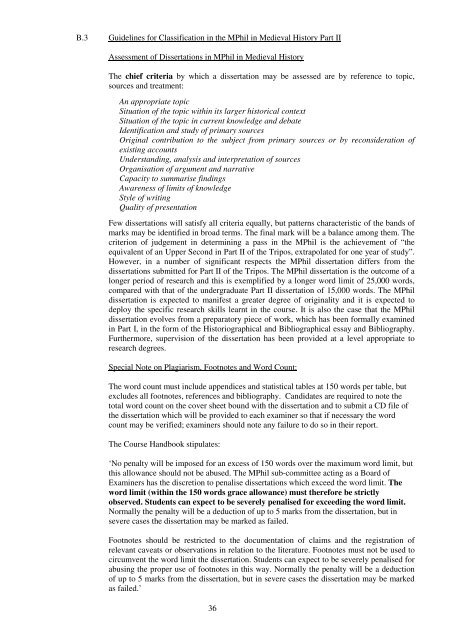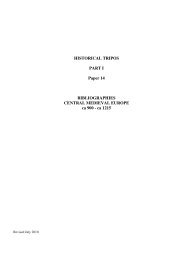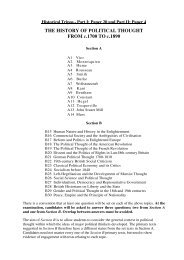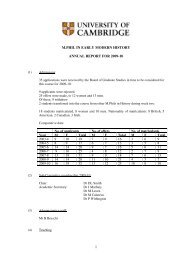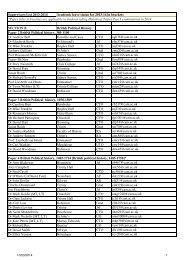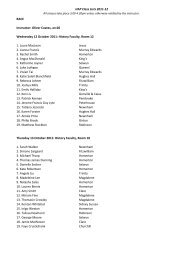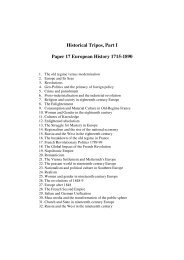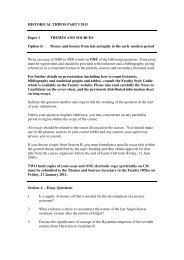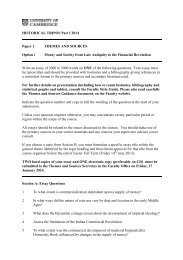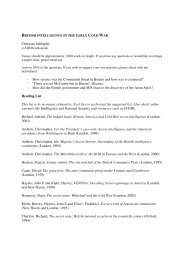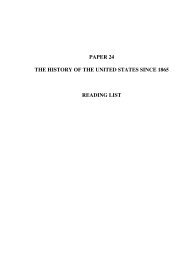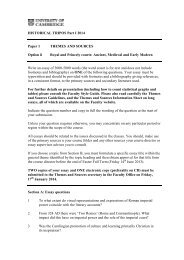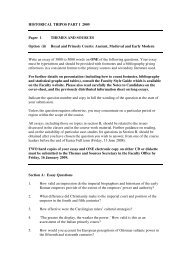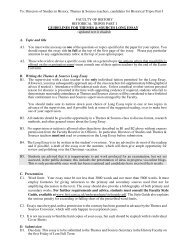Course Handbook - Faculty of History
Course Handbook - Faculty of History
Course Handbook - Faculty of History
Create successful ePaper yourself
Turn your PDF publications into a flip-book with our unique Google optimized e-Paper software.
B.3 Guidelines for Classification in the MPhil in Medieval <strong>History</strong> Part II<br />
Assessment <strong>of</strong> Dissertations in MPhil in Medieval <strong>History</strong><br />
The chief criteria by which a dissertation may be assessed are by reference to topic,<br />
sources and treatment:<br />
An appropriate topic<br />
Situation <strong>of</strong> the topic within its larger historical context<br />
Situation <strong>of</strong> the topic in current knowledge and debate<br />
Identification and study <strong>of</strong> primary sources<br />
Original contribution to the subject from primary sources or by reconsideration <strong>of</strong><br />
existing accounts<br />
Understanding, analysis and interpretation <strong>of</strong> sources<br />
Organisation <strong>of</strong> argument and narrative<br />
Capacity to summarise findings<br />
Awareness <strong>of</strong> limits <strong>of</strong> knowledge<br />
Style <strong>of</strong> writing<br />
Quality <strong>of</strong> presentation<br />
Few dissertations will satisfy all criteria equally, but patterns characteristic <strong>of</strong> the bands <strong>of</strong><br />
marks may be identified in broad terms. The final mark will be a balance among them. The<br />
criterion <strong>of</strong> judgement in determining a pass in the MPhil is the achievement <strong>of</strong> “the<br />
equivalent <strong>of</strong> an Upper Second in Part II <strong>of</strong> the Tripos, extrapolated for one year <strong>of</strong> study”.<br />
However, in a number <strong>of</strong> significant respects the MPhil dissertation differs from the<br />
dissertations submitted for Part II <strong>of</strong> the Tripos. The MPhil dissertation is the outcome <strong>of</strong> a<br />
longer period <strong>of</strong> research and this is exemplified by a longer word limit <strong>of</strong> 25,000 words,<br />
compared with that <strong>of</strong> the undergraduate Part II dissertation <strong>of</strong> 15,000 words. The MPhil<br />
dissertation is expected to manifest a greater degree <strong>of</strong> originality and it is expected to<br />
deploy the specific research skills learnt in the course. It is also the case that the MPhil<br />
dissertation evolves from a preparatory piece <strong>of</strong> work, which has been formally examined<br />
in Part I, in the form <strong>of</strong> the Historiographical and Bibliographical essay and Bibliography.<br />
Furthermore, supervision <strong>of</strong> the dissertation has been provided at a level appropriate to<br />
research degrees.<br />
Special Note on Plagiarism, Footnotes and Word Count:<br />
The word count must include appendices and statistical tables at 150 words per table, but<br />
excludes all footnotes, references and bibliography. Candidates are required to note the<br />
total word count on the cover sheet bound with the dissertation and to submit a CD file <strong>of</strong><br />
the dissertation which will be provided to each examiner so that if necessary the word<br />
count may be verified; examiners should note any failure to do so in their report.<br />
The <strong>Course</strong> <strong>Handbook</strong> stipulates:<br />
‘No penalty will be imposed for an excess <strong>of</strong> 150 words over the maximum word limit, but<br />
this allowance should not be abused. The MPhil sub-committee acting as a Board <strong>of</strong><br />
Examiners has the discretion to penalise dissertations which exceed the word limit. The<br />
word limit (within the 150 words grace allowance) must therefore be strictly<br />
observed. Students can expect to be severely penalised for exceeding the word limit.<br />
Normally the penalty will be a deduction <strong>of</strong> up to 5 marks from the dissertation, but in<br />
severe cases the dissertation may be marked as failed.<br />
Footnotes should be restricted to the documentation <strong>of</strong> claims and the registration <strong>of</strong><br />
relevant caveats or observations in relation to the literature. Footnotes must not be used to<br />
circumvent the word limit the dissertation. Students can expect to be severely penalised for<br />
abusing the proper use <strong>of</strong> footnotes in this way. Normally the penalty will be a deduction<br />
<strong>of</strong> up to 5 marks from the dissertation, but in severe cases the dissertation may be marked<br />
as failed.’<br />
36


